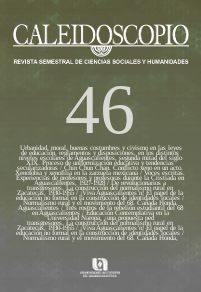Deslices en la búsqueda de sentido. De la netnografia en facebook a rtweet
DOI:
https://doi.org/10.33064/46crscsh3381Palabras clave:
metodología, cultura digital, redes sociodigitalesResumen
La cultura digital ha supuesto un cambio en la significación de prácticas y discursos cotidianos. Nuestro entorno se ha visto modificado por una serie de referencias y actuaciones que han supuesto una adecuación a nuestro ecosistema mediático. Dar cuenta de ello ha requerido buscar estrategias para interpretar qué habilidades hemos desarrollado para interactuar en estos espacios. Se presentan dos ejercicios de la búsqueda de sentidos que se construyen en la mediación de las redes sociodigitales. La propuesta es contrastar las posibilidades de ambas y retar sus limitaciones, así como los imbricados caminos de descubrimiento de sus potencialidades. Se trata de exponer las complicaciones y asombros que han formado parte de las exploraciones en estos caminos. Se proponen tres caminos que se vinculan por medio de su interés en la búsqueda de sentidos en el intercambio comunicativo cotidiano. Al mismo tiempo, se diferencian en mucho más que su enfoque cualitativo-cuantitativo.
Descargas
Citas
Barba, R. (2017). Otaku mexicanos el análisis de la cultura participativa de aficionados a las narrativas transmediales japonesas [Tesis de Doctorado]. Universidad Autónoma de Aguascalientes. http://bdigital.dgse.uaa.mx:8080/xmlui/bitstream/handle/11317/1390/420097.pdf?sequence=1&isAllowed=y
Barba, R. (2021). La indagación netnográfica de dos comunidades virtuales de maternidad como espacios de significación. Anuario de Investigación CONEICC, 1(27), 38–50. https://doi.org/10.38056/2020aiccXXVII206
Calvo, E. (2015). Anatomía política de Twitter en Argentina. Tuiteando #Nisman. Capital Intelectual.
Corral, G. A. y Barba, R. (2021). Estrategia de comunicación pública y discurso en Twitter. En Y. Carrera Ontiveros (Ed.), Medios, elecciones y opinión pública (pp. 93–110). Tirant Lo Blanch.
De Marchis, G. P. (2012). La validez externa de las encuestas en la web. Amenazas y su control. Estudios sobre el Mensaje Periodístico, 18, 263–272. https://doi.org/10.5209/rev_ESMP.2012.v18.40980
Del Fresno, M. (2011). Netnografía. UOC.
Díaz de Rada, V. (2012). Ventajas e inconvenientes de la encuesta por Internet. Papers: Revista de Sociología, 97(1), 193–223. https://doi.org/10.5565/rev/papers/v97n1.71
Fix-Fierro, H., Flores, J. I. y Valadés, D. (2017). Los mexicanos y su Constitución. Tercera encuesta nacional de cultura. UNAM. http://www.losmexicanos.unam.mx/MexicanosConstitucion/pdf/Mexicanos_Constitucion.pdf
García Reyes, C. U. (2018). Desafección política en México ¿Es factible incrementar el interés de los mexicanos en la política?. Senado de la República. http://bibliodigitalibd.senado.gob.mx/handle/123456789/4118
Islas, O. (2021, 26 de septiembre). Estadísticas de Twitter en México. Razón y Palabra. http://www.razonypalabra.org.mx/espejo/ESPEJO_2011/twitter.html
Jenkins, H. (2009). Confronting the challenges of participatory culture: media education for the 21st century. The MIT Press.
Kligler-Vilenchik, N. y Shresthova, S. (2012). Learning Through Practice: Participatory Culture Civics. Academia. https://bit.ly/3BKVwHe
Kozinets, R. V. (2010). Netnography: ethnographic research in the age of the internet (1st ed). Sage.
Lüfkens, M. (2018) Twiplomacy Study 2018. Burson, Cohn & Wolfe. https://uscpublicdiplomacy.org/story/twiplomacy-study-2018
IDG TECHTalk. (2020, 23 de enero). How to search Twitter with R [Archivo de Vídeo]. Youtube. https://www.youtube.com/watch?v=O0gTv9VGRig
Ortega Gutiérrez, E., Urbina, G. A. y Meneses Rocha, M. E. (2014). Enfoque metodológico mixto aplicado al diseño de encuestas para el estudio de la participación política y uso de redes sociales en jóvenes universitarios. Alaic, Teoría y Metodología de la Investigación en Comunicación. http://congreso.pucp.edu.pe/alaic2014/wp-content/uploads/2013/09/Enedina-Ortega-Gutiérrez-.pdf
Ruiz, M. À. (2008). Ciberetnografía: comunicad y territorio en el entorno virtual. In E. Ardèvol, A. Estalella y D. Domínguez (Eds.), La mediación tecnológica en la práctica etnográfica (pp. 117–132). Ankulegi Antropologia Elkartea. http://www.ankulegi.org/5-la-mediacion-tecnologica-en-la-practica-etnografica/
Samuel, J., Myles, R. y Kashyap, R., (2019). That Message Went Viral?! Exploratory Analytics and Sentiment Analysis into the Propagation of Tweets. 2019 Annual Proceedings of Northeast Decision Sciences Institute (NEDSI) Conference, Philadelphia, USA. https://arxiv.org/ftp/arxiv/papers/2004/2004.09718.pdf
SEGOB. (2013). Encuesta Nacional sobre Cultura Política y Prácticas Ciudadanas. ENCUP – 2012. http://encup.gob.mx/es/Encup/Quinta_ENCUP_2012
Turpo, O. W. (2008). La netnografía: un método de investigación en Internet. Educar.
Wojcik, S. y Hughes, A. (2019b). 10 facts about Americans and Twitter. Pew Research Center, Internet & Technology. https://www.pewresearch.org/internet/2019/04/24/sizing-up-twitter-users/
Descargas
Publicado
Cómo citar
Número
Sección
Licencia
Derechos de autor 2022 Rosario Barba González, Gabriel A. Corral Velázquez

Esta obra está bajo una licencia internacional Creative Commons Atribución-NoComercial-CompartirIgual 4.0.
Licencia Creative Commons Atribución-NoComercial-CompartirIgual 4.0 Internacional
El lector es libre de compartir o adaptar el material en cualquier medio o formato bajo las condiciones siguientes: (a) debe reconocer adecuadamente la autoría, proporcionar un enlace a la licencia e indicar si se han realizado cambios; (b) no puede utilizar el material para una finalidad comercial y (c) si remezcla, transforma o crea a partir del material, deberá difundir sus contribuciones bajo la misma licencia que el original.
Resumen de la licencia
https://creativecommons.org/licenses/by-nc-sa/4.0/deed.es_ES
Texto completo de la licencia
https://creativecommons.org/licenses/by-nc-sa/4.0/legalcode
Cada autor es responsable del contenido de su artículo. En el caso de un texto colectivo, el primer autor asume la responsabilidad intelectual de los resultados del proceso editorial; los autores son responsables de obtener la licencia de autor para reproducir materiales gráficos o fotográficos que pertenecen a terceros.
Los autores asumen plena responsabilidad en el caso de falsificación de datos o falta de autenticidad en la investigación. Se comprometen, también, a no reutilizar trabajos ya publicados, total o parcialmente, para presentarlos en otra publicación.
Estas condiciones aplican tanto a la versión impresa como a la versión electrónica de la revista.


















